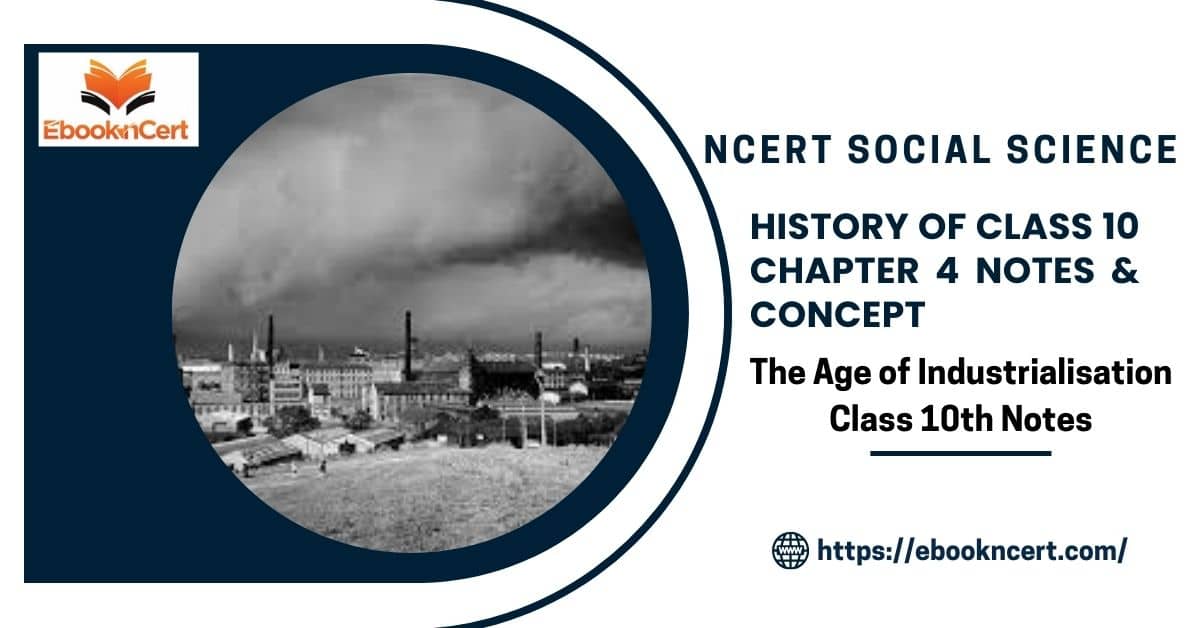NCERT Social Science History of Class 10 Chapter 4 Notes & Concept- The Age of Industrialisation Class 10th Notes
Welcome to our comprehensive guide on “NCERT Social Science History of Class 10 Chapter 4 Notes & Concept – The Age of Industrialisation Class 10th Notes“! In this blog, we delve deep into the pivotal chapter of class 10 history, offering concise yet comprehensive notes on the age of industrialisation. As students navigate through the complexities of this period in history, our meticulously crafted pointers serve as invaluable aids, elucidating key concepts, historical contexts, and societal impacts.
Our focus is to provide students with a clear understanding of the age of industrialisation, enabling them to grasp its significance and implications with clarity and confidence. Through our meticulously curated notes, we aim to simplify complex topics, breaking them down into digestible chunks that facilitate effective learning and retention. In addition to the detailed notes, we understand the importance of accessibility and convenience for students preparing for their exams.
Hence, we offer a free PDF download of our chapter notes on the age of Industrialisation class 10 pdf, allowing students to access the material anytime, anywhere, and even offline. This resource is a handy reference tool, aiding students in their exam preparation and reinforcing their understanding of the age of industrialisation. At NCERT History Chapter 4 The Age Of Industrialisation Class 10th Notes & Concept, our mission is to empower students with high-quality educational resources that foster academic success and lifelong learning.
Whether you’re a student seeking clarity on NCERT Chapter 4 History Class 10 or an educator looking for supplementary materials, our 4th chapter notes on the age of industrialisation are designed to meet your needs effectively.
Topic Covered in this NCERT History Chapter 4 Notes The Age of Industrialisation for Class 10
| Topics No. | Topics Name |
|---|---|
| 1 | Introduction to The Age of Industrialisation |
| 2 | Before the Industrial Revolution |
| 3 | Hand Labour and Steam Power |
| 4 | Industrialisation in the Colonies |
| 5 | Factories Come Up |
| 6 | The Peculiarities of Industrial Growth |
| 7 | Market for Goods |
Download NCERT History Class 10th History Chapter 4 Notes PDF: The Age of Industrialisation Class 10th Notes
Download our free PDF notes of the Age of Industrialisation class 10 of “NCERT Social Science History of Class 10 Chapter 4 Notes & Concept – The Age of Industrialisation Class 10th Notes” today and embark on a journey of learning and discovery!
Topics of the NCERT History Chapter 4 for Class 10th The Age of Industrialisation
Next History Chapters Notes
| Chapters No. | Chapters Name |
|---|---|
| Chapter 1 | The Rise of Nationalism in Europe Notes |
| Chapter 2 | Nationalism In India Notes |
| Chapter 3 | The Making of Global World Notes |
| Chapter 4 | The Age of Industrialisation Notes |
| Chapter 5 | Print Culture And The Modern World Notes |
New Words
- Orient – The countries to the east of the Mediterranean, usually referring to Asia. The term arises out of a Western viewpoint that sees this region as pre-modern, traditional and mysterious.
- Proto – Indicating the first or early form of something.
- Stapler – A person who ‘staples’ or sorts wool according to its fibre.
- Fuller – A person who ‘fulls’ – that is, gathers – cloth by pleating.
- Carding – The process in which fibres, such as cotton or wool, are prepared prior to spinning.
- Spinning Jenny – Devised by James Hargreaves in 1764, this machine speeded up the spinning process and reduced labour demand. By turning one single wheel a worker could set in motion a number of spindles and spin several threads at the same time.
- Sepoy – This is how the British pronounced the word sipahi, meaning an Indian soldier in the service of the British.
- Fly shuttle – It is a mechanical device used for weaving, moved by means of ropes and pullies. It places the horizontal threads ( called the weft) into the verticle threads (called the warp). The invention of the fly shuttle made it possible for weavers to operate large looms and weave wide pieces of cloth.
FAQs on The Age of Industrialisation Class 10th
Q1. What topics are covered in the Age of Industrialisation Class 10th notes?
Answer: Our notes cover a wide range of topics related to the Age of Industrialisation, including the Industrial Revolution, its causes and consequences, the impact on society, economy, and environment, and key developments during this period.
Q2. Are these notes suitable for CBSE Class 10 history exam preparation?
Answer: Yes, our notes are specifically tailored to align with the CBSE Class 10 history curriculum. They provide comprehensive coverage of Chapter 4 – The Age of Industrialisation, ensuring that students are well-prepared for their exams.
Q3. Do you provide explanations for complex concepts in the Age of Industrialisation notes?
Answer: Absolutely! We understand that some concepts related to the Age of Industrialisation can be challenging to grasp. That’s why our notes include detailed explanations, examples, and illustrations to help students understand even the most complex ideas with ease.
Q4. Can I access these notes offline?
Answer: Yes, you can download our notes in PDF format for offline access. Simply click on the provided link and save the PDF to your device for convenient studying anytime, anywhere, even without an internet connection.
Q5. Are these notes suitable for self-study or revision purposes?
Answer: Definitely! Whether you’re studying independently or revising for exams, our Age of Industrialisation Class 10th notes are an excellent resource. They are structured in a concise and organized manner, making them ideal for self-study and quick review sessions to reinforce your understanding of key concepts.

